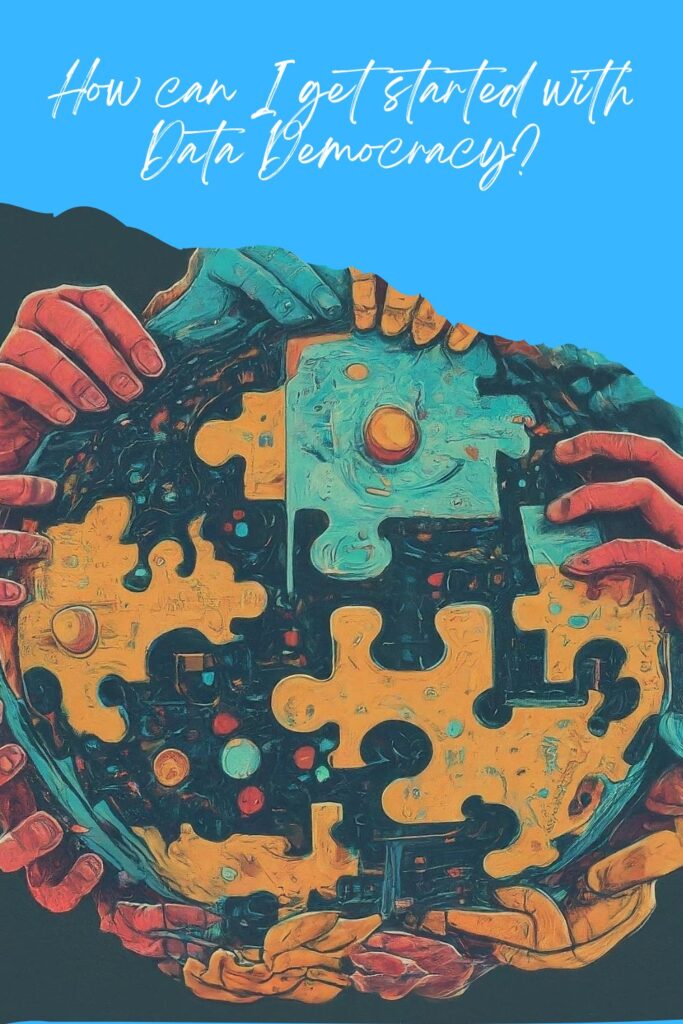Reclaim your Right, Shape your Future: The Data Democracy Revolution Starts Now!
February 18, 2024
Reclaim your Right, Shape your Future: The Data Democracy Revolution Starts Now! Let’s dive deeper into the concept of Data Democracy and explore how organizations can foster an environment where data is accessible, democratized, and put to effective use:
- Data Democracy Defined:
- Data Democracy refers to a culture where data is not confined to a select few experts but is accessible to everyone within an organization. It’s about empowering individuals across different roles and functions to leverage data for decision-making.
- Imagine a workplace where data isn’t locked away in silos or guarded by gatekeepers. Instead, it flows freely, enabling informed choices at all levels.
- Investing in Robust Infrastructure:
- To achieve Data Democracy, organizations must invest in robust data infrastructure. This includes:
- Data Warehouses: Central repositories that consolidate data from various sources (e.g., databases, APIs, logs).
- Data Lakes: Scalable storage for raw and unstructured data.
- ETL (Extract, Transform, Load) Pipelines: Mechanisms to extract, clean, and transform data for analysis.
- A well-architected infrastructure ensures that data is organized, secure, and accessible.
- To achieve Data Democracy, organizations must invest in robust data infrastructure. This includes:
3. Analytics Tools and Platforms:
- Organizations should provide employees with user-friendly analytics tools. These tools allow users to explore data, create visualizations, and derive insights without needing specialized technical skills.
- Examples include:
- Business Intelligence (BI) Tools: Dashboards, charts, and reports that present data in a digestible format.
- Self-Service Analytics Platforms: Empower users to build their own queries and analyses.
- Collaborative Tools: Platforms that facilitate data sharing and collaboration.
4. Reporting and Visualization:
- Data becomes meaningful when it’s presented effectively. Reporting platforms play a crucial role in Data Democracy.
- Features to consider:
- Customizable Reports: Users can tailor reports to their specific needs.
- Automated Alerts: Notify stakeholders when specific thresholds are met.
- Interactive Dashboards: Enable exploration and drill-down capabilities.
- Storytelling Visuals: Infographics, charts, and narratives that convey insights.
5. Making Data Readily Available:
- Data should be as accessible as grabbing a book from a library shelf. This involves:
- Data Catalogs: Indexes that describe available datasets, their attributes, and usage guidelines.
- Data APIs: Interfaces for programmatic access to data.
- Role-Based Access Control: Ensuring that users get access to relevant data based on their roles.
6. Usability and Training:
- Democratizing data means ensuring that users know how to use it effectively.
- Training Programs:
- Regular training sessions on data tools, best practices, and interpretation.
- Encourage curiosity and experimentation.
- User-Friendly Interfaces:
- Intuitive interfaces reduce the learning curve.
- Documentation and FAQs for common queries.
Remember, Data Democracy isn’t just about technology—it’s a cultural shift. When data is democratized, decision-making becomes more informed, collaborative, and impactful. 📊🌐
How can I get started with Data Democracy?

To embark on the journey of Data Democracy, consider these practical steps:
- Assign a Leader: Find your data evangelist. Consider recruiting a Chief Data Officer (CDO) who takes ownership of your organization’s data. A CDO can drive the business forward by integrating data knowledge into everyday organizational life, from revenue growth to operational efficiency.
- Develop an Overarching Data Strategy: Avoid political turmoil by creating a coherent data and analytics strategy. Integrate it with your overall business strategy from the start. Establish common methods, practices, and processes to control and distribute data across the organization. Involve the entire team to drive the strategy forward. Remember, the right infrastructure is crucial for success. Evaluate whether on-premises, cloud, or a hybrid approach aligns with your goals.
- Educate Your People: Develop an employee education process. Upskill your team to harness data effectively. Encourage imagination and innovative ideas. When everyone understands the value of data, they become active contributors to data democratization.
- Implement the Right Tech Stack: Build on strong foundations. Choose the right technology stack that supports your data democratization goals. Consider factors like speed, cost, future requirements, and workload types. A hybrid cloud approach can often be efficient, allowing you to manage sensitive workloads on-premises while delivering data to many people in real-time via the cloud.
- Write Your Own History: Embrace data democratization as a revolutionary movement within your organization. Empower your teams to use data creatively and innovatively. Break down barriers between people and data, providing the freedom to explore insights and drive positive change.
Remember, data democratization is about solving day-to-day data challenges and making data accessible to all. By following these steps, you’ll pave the way for a more inclusive and data-driven future! 🌟📊🚀
Benefits of data democratization?

Data democratization brings several advantages to organizations and individuals alike:
- Empowerment and Inclusivity: By making data accessible to everyone, data democratization empowers employees at all levels. It breaks down silos and ensures that insights are not limited to a select few. When everyone has access to data, decision-making becomes more inclusive and informed.
- Faster Decision-Making: When data is readily available, decisions can be made swiftly. Teams can analyze real-time information, identify trends, and respond promptly to changing circumstances. This agility is crucial in today’s fast-paced business environment.
- Innovation and Creativity: Data democratization encourages creativity. When employees have the freedom to explore data, they can discover new patterns, generate innovative ideas, and propose novel solutions. This fosters a culture of continuous improvement.
- Improved Productivity: Accessible data reduces dependency on specialized data teams. Employees can retrieve the information they need without waiting for reports or approvals. This streamlines workflows and boosts overall productivity.
- Better Customer Insights: When customer-facing teams (such as sales, marketing, and customer support) have direct access to data, they can understand customer behavior, preferences, and pain points. This leads to personalized experiences and better customer satisfaction.
- Cost Efficiency: Data democratization reduces the need for custom data requests and manual data extraction. It minimizes the time spent on data preparation and allows resources to be allocated more efficiently.
- Transparency and Accountability: Open access to data promotes transparency within an organization. When decisions are based on shared information, accountability increases. It becomes easier to track performance and measure outcomes.
- Data-Driven Culture: Data democratization nurtures a data-driven mindset. It encourages employees to think analytically, ask questions, and seek evidence-based answers. Over time, this cultural shift enhances overall data literacy.
- Compliance and Security: While democratizing data, organizations must also prioritize security and compliance. Proper access controls, encryption, and data governance ensure that sensitive information remains protected.
- Competitive Advantage: Organizations that embrace data democratization gain a competitive edge. They can adapt swiftly, innovate faster, and make informed decisions that drive growth.
Remember, data democratization is not just about technology—it’s a cultural shift that requires leadership commitment, education, and a shared vision. When done right, it can revolutionize how organizations operate and thrive in the data-driven era! 🌐📈✨

Challenges of data democratization?
Data democratization, while beneficial, also presents several challenges that organizations need to address:
- Security Risks: Opening up data access to a wider audience can lead to security vulnerabilities. Organizations must strike a balance between accessibility and safeguarding sensitive information. Proper access controls, encryption, and data masking are essential.
- Data Quality: When more people interact with data, the risk of poor data quality increases. Inaccurate or incomplete data can lead to flawed decisions. Organizations must invest in data cleansing, validation, and governance processes.
- Privacy Concerns: Data democratization can inadvertently expose personal or confidential information. Compliance with privacy regulations (such as GDPR or CCPA) becomes critical. Anonymization techniques and clear policies are necessary.
- Lack of Data Literacy: Not everyone is equally comfortable with data. Some employees may struggle to interpret complex datasets or understand statistical concepts. Training programs and data literacy initiatives are crucial.
- Resistance to Change: Traditional hierarchies may resist sharing data openly. Siloed mindsets can hinder progress. Leadership buy-in and cultural shifts are necessary to overcome resistance.
- Data Overload: Too much data can overwhelm users. Organizations must provide relevant context and tools for effective data exploration. Prioritizing essential information is key.
- Unequal Access: Despite democratization efforts, disparities in data access may persist. Some teams or individuals may still have privileged access, creating an uneven playing field.
- Technical Infrastructure: Scalability, performance, and integration challenges arise when handling large volumes of data. Organizations need robust infrastructure to support data democratization.
- Governance Complexity: Balancing openness with control is tricky. Organizations must define clear data ownership, establish policies, and monitor compliance. Over-governance can stifle innovation, while under-governance risks chaos.
- Cultural Shift: Data democratization requires a mindset shift. Employees must embrace data-driven decision-making. Changing entrenched practices and fostering a data-centric culture takes time.
In summary, data democratization is a journey that involves addressing these challenges while reaping the benefits of informed decision-making and organizational agility. 🌐🔍🚀

Powerful AI Tools for Business – From Data to Dollars
Unleash Your Organization’s Potential: How To Make a Data Driven Decision Making Revolution


